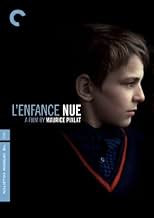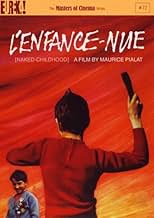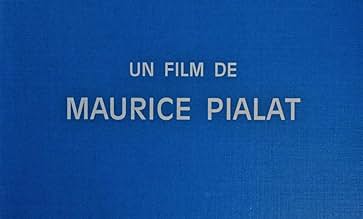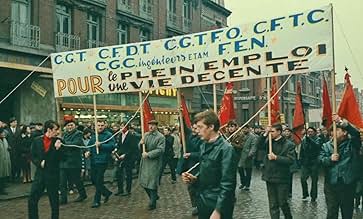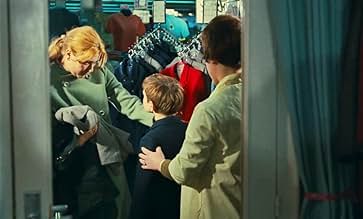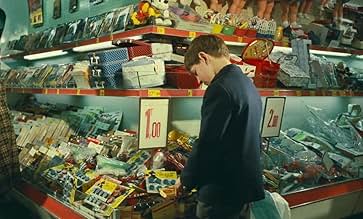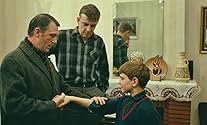IMDb रेटिंग
7.4/10
2.8 हज़ार
आपकी रेटिंग
एक दुखी, दत्तक बच्चा शरारती और झूठा बन जाता हैं, जबकि उसके दत्तक माता-पिता उसे प्यार-दुलार से पालने की पूरी कोशिश करते हैं. लेकिन अनाथ बच्चे के भावनात्मक और विचलित करने वाले चित्रण के लिए यह... सभी पढ़ेंएक दुखी, दत्तक बच्चा शरारती और झूठा बन जाता हैं, जबकि उसके दत्तक माता-पिता उसे प्यार-दुलार से पालने की पूरी कोशिश करते हैं. लेकिन अनाथ बच्चे के भावनात्मक और विचलित करने वाले चित्रण के लिए यह बहुत कम और शायद, बहुत देर हो चुकी हैं.एक दुखी, दत्तक बच्चा शरारती और झूठा बन जाता हैं, जबकि उसके दत्तक माता-पिता उसे प्यार-दुलार से पालने की पूरी कोशिश करते हैं. लेकिन अनाथ बच्चे के भावनात्मक और विचलित करने वाले चित्रण के लिए यह बहुत कम और शायद, बहुत देर हो चुकी हैं.
- निर्देशक
- लेखक
- स्टार
- पुरस्कार
- 1 जीत और कुल 1 नामांकन
फ़ीचर्ड समीक्षाएं
10bob998
Well... Les 400 coups has been placed at no. 140 in IMDb's list of all-time great films, and as much as I admire Francois Truffaut's work, I am more impressed by L'Enfance nue, Pialat's first film, made when he was 43. Owing to the vagaries of the distribution system, I never saw it when it first appeared, and am now able to write about it thanks to TFO's enlightened film series.
Pialat was a realist, maybe to the point of turning off his audiences. If you have seen A nos amours or Loulou, you know you're in for a gruelling experience. Actors pushed to the breaking point, cutting that puts you right in the action, without any establishing background. The scene between Francois and Raoul, where the latter gets out of bed to look for Francois, then the knife slams into the door, just missing Raoul's head by inches, is unforgettable.
The actors are mostly amateurs; they do not try to attract your attention with gestures or speech, they just settle in and tell the story. The "assistance publique" workers are sympathetically rendered: there's no hint of Pialat trying to settle scores with government agencies (cf Une si jolie petite plage). The Minguet family, the second one we see--how many have there been in all?--is beautifully drawn. Just to watch Madame bringing soup to Meme, arranging the clothes, the napkin, it's a marvel of observation. The story hinges on Francois, of course, and his performance is angry, violent, joyous, destructive--he's Pialat's alter ego, I can't help but feel.
Pialat was a realist, maybe to the point of turning off his audiences. If you have seen A nos amours or Loulou, you know you're in for a gruelling experience. Actors pushed to the breaking point, cutting that puts you right in the action, without any establishing background. The scene between Francois and Raoul, where the latter gets out of bed to look for Francois, then the knife slams into the door, just missing Raoul's head by inches, is unforgettable.
The actors are mostly amateurs; they do not try to attract your attention with gestures or speech, they just settle in and tell the story. The "assistance publique" workers are sympathetically rendered: there's no hint of Pialat trying to settle scores with government agencies (cf Une si jolie petite plage). The Minguet family, the second one we see--how many have there been in all?--is beautifully drawn. Just to watch Madame bringing soup to Meme, arranging the clothes, the napkin, it's a marvel of observation. The story hinges on Francois, of course, and his performance is angry, violent, joyous, destructive--he's Pialat's alter ego, I can't help but feel.
10nmegahey
Looking not unlike Jean-Pierre Léaud, Michel Tarrazon's young 10 year-old tearaway François could very well be an alternative continuation of the story of Truffaut's Antoine Doinel after the 400 Blows (Truffaut indeed was one of the film's producers alongside Claude Berri), but the treatment from Maurice Pialat, in his first feature film, is notably more harshly realist. Abandoned by his parents, François is passed from one foster family to another, each of them finding it impossible to control a young boy who inevitably has behavioural problems and gets into a lot of trouble torturing cats, stealing from other kids and wielding a large knife. Although he is given love and affection by the poor families who take him in for the little extra money they will receive, he inevitably never feels like he belongs and ends up turning against the people who want to help him.
Made when he was 43 years old, L'Enfance Nue clearly has strongly autobiographical elements although Pialat wasn't placed in the hands of the social services, he was brought up by his grandparents and did feel abandoned by his parents. The film also depicts the social circumstances of the period and the poverty of the outlying suburban districts (already the subject of the director's 1961 short film L'Amour Existe). Using non-professional actors, L'Enfance Nue consequently also has a certain almost documentary-like realism that would become characteristic of Pialat's hard-hitting style.
Made when he was 43 years old, L'Enfance Nue clearly has strongly autobiographical elements although Pialat wasn't placed in the hands of the social services, he was brought up by his grandparents and did feel abandoned by his parents. The film also depicts the social circumstances of the period and the poverty of the outlying suburban districts (already the subject of the director's 1961 short film L'Amour Existe). Using non-professional actors, L'Enfance Nue consequently also has a certain almost documentary-like realism that would become characteristic of Pialat's hard-hitting style.
Loyal viewers of French cinema would agree if one were to claim that to a very large extent film directors in France tend to take their inspirations from events which have had significant impact on their lives. This is also the case with two directors associated with this film namely Maurice Pialat and François Truffaut who experienced troubled times during their individual childhoods. In Maurice Pialat's Naked Childhood / L'Enfance Nue, the viewers get a first hand view of the tough times faced by some French parents who raise adopted children. As far as the 'nakedness' of the film's title is concerned, it has a lot to do with the brutal, direct and frank portrayal of one adopted boy who is rejected by all and sundry due to his bad behavior and mood swings. Maurice Pialat has avoided any kind of sentimentality as his film is for both parents and children. The focus is more on recognizing a child as an individual, a type of human being who deserves to be understood. Although the major focus in this film is about a 'difficult' child, a kind of emotional balance is created as its story has been told from the point of view of a second adopted child and other adults who have become a part of these boys' lives.
Arlette Langmann and Maurice Pialat wrote the screenplay for "Naked Childhood" and Pialat himself directed this film. In many ways, it is reminiscent of the story of Antoine Doinel in Truffaut's film "The 400 Blows", as it follows a neglected child through the foster care system--a very grim one indeed. Apparently, the story was inspired by an actual child who was raised by foster parents Marie-Louise and René Thierry--two folks who the director asked to appear in this film as the elderly foster parents.
This is the story about a young boy who was given up by his mother to the foster care system. The child, François (Michel Terrazon) acts out in response to being rejected in his first foster home--and as a result, is passed on to another foster home. The bottom line is that the boy has learned to be angry and violent and he appears to be headed for disaster unless something changes very quickly. Is there any hope for the kid? Can the elderly couple get through to him? This is an unusual film because it does not feature non-stop action and suspense. Sometimes the film is a bit slow--but not in a bad way--more like real life. It also features a little boy who is far from perfect but who is not constantly bad, either--he's more amoral than anything else. I liked this, as life is very rarely black & white--though it frequently is in movies. And, the film really doesn't have an ending. Because of this, the film feels more like a slice of life than a movie--which is pretty typical of the French New Wave style of the 1960s. It's probably not the sort of thing the average viewer would like, but it is a quality production. While this sort of thing does not make for the most pleasant viewing, having worked in the welfare system myself many years ago, I can certainly relate to the story of the boy--having seen kids passed on from one home to another to another. It's really no wonder the kids often act out and what is amazing is that many don't!
This is the story about a young boy who was given up by his mother to the foster care system. The child, François (Michel Terrazon) acts out in response to being rejected in his first foster home--and as a result, is passed on to another foster home. The bottom line is that the boy has learned to be angry and violent and he appears to be headed for disaster unless something changes very quickly. Is there any hope for the kid? Can the elderly couple get through to him? This is an unusual film because it does not feature non-stop action and suspense. Sometimes the film is a bit slow--but not in a bad way--more like real life. It also features a little boy who is far from perfect but who is not constantly bad, either--he's more amoral than anything else. I liked this, as life is very rarely black & white--though it frequently is in movies. And, the film really doesn't have an ending. Because of this, the film feels more like a slice of life than a movie--which is pretty typical of the French New Wave style of the 1960s. It's probably not the sort of thing the average viewer would like, but it is a quality production. While this sort of thing does not make for the most pleasant viewing, having worked in the welfare system myself many years ago, I can certainly relate to the story of the boy--having seen kids passed on from one home to another to another. It's really no wonder the kids often act out and what is amazing is that many don't!
Naked childhood or L'enfance nue (original title) is a film that deals with issues such as under-privileged children, foster-parenting and in general children being raised apart from their parents. The director approaches his subject with a realistic, almost documentary narrative with the least amount of dramatization. Therefore viewers will be shown a pretty straightforward story about a troublesome kid and what he is going through with foster-parents, school, social service agents and so on.
I think the film does a good job at showing us that no one's to blame for what eventually happens in these scenarios and yet the current method is a failure for these children. It's a film that is not very shocking or disturbing (although there are couple scenes) but it can make one think for a while.
I think the film does a good job at showing us that no one's to blame for what eventually happens in these scenarios and yet the current method is a failure for these children. It's a film that is not very shocking or disturbing (although there are couple scenes) but it can make one think for a while.
क्या आपको पता है
- ट्रिवियाMarie-Louise Thierry and René Thierry were real life foster parents. Maurice Pialat became acquainted with the couple and cast them in lead roles after he began researching the plight of children in the foster care system.
- कनेक्शनFeatured in Il tempo che ci vuole (2024)
टॉप पसंद
रेटिंग देने के लिए साइन-इन करें और वैयक्तिकृत सुझावों के लिए वॉचलिस्ट करें
- How long is Naked Childhood?Alexa द्वारा संचालित
विवरण
बॉक्स ऑफ़िस
- दुनिया भर में सकल
- $1,993
- चलने की अवधि
- 1 घं 23 मि(83 min)
- ध्वनि मिश्रण
- पक्ष अनुपात
- 1.66 : 1
इस पेज में योगदान दें
किसी बदलाव का सुझाव दें या अनुपलब्ध कॉन्टेंट जोड़ें

